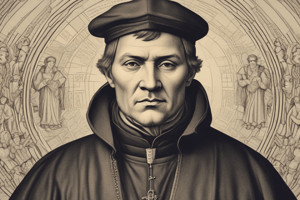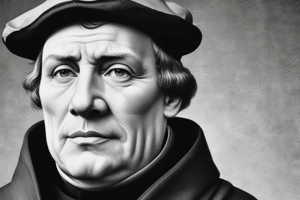Podcast
Questions and Answers
According to Luther, Anfechtungen is a feeling of joy and happiness.
According to Luther, Anfechtungen is a feeling of joy and happiness.
False (B)
Gabriel Beale was a 16th century theologian.
Gabriel Beale was a 16th century theologian.
False (B)
Nominalism was one of the traditions that Gabriel Beale belonged to.
Nominalism was one of the traditions that Gabriel Beale belonged to.
True (A)
Voluntarism argues that God's intellect is more important than God's will.
Voluntarism argues that God's intellect is more important than God's will.
According to voluntarism, something is good because God wills it to be good.
According to voluntarism, something is good because God wills it to be good.
Martin Luther was a theologian in the tradition of Augustine.
Martin Luther was a theologian in the tradition of Augustine.
Anfechtungen is a feeling closely related to whether God would pardon Luther because of his sin.
Anfechtungen is a feeling closely related to whether God would pardon Luther because of his sin.
Gabriel Beale wrote a major work called The Canon of the Bible.
Gabriel Beale wrote a major work called The Canon of the Bible.
According to Aristotle, the substance of an object is known through its accidents.
According to Aristotle, the substance of an object is known through its accidents.
The Church used the distinction between substance and accidents in a way that Aristotle would have approved.
The Church used the distinction between substance and accidents in a way that Aristotle would have approved.
The priest celebrating the mass only symbolically represents Christ.
The priest celebrating the mass only symbolically represents Christ.
The Church's doctrine of transubstantiation states that the bread and wine are replaced by Christ's body and blood.
The Church's doctrine of transubstantiation states that the bread and wine are replaced by Christ's body and blood.
Martin Luther's views on the Eucharist were similar to the Church's doctrine of transubstantiation.
Martin Luther's views on the Eucharist were similar to the Church's doctrine of transubstantiation.
The Reformation was a movement that sought to reform the Church from within.
The Reformation was a movement that sought to reform the Church from within.
Christian pastoral care emphasizes the importance of the priest's role in the Eucharist.
Christian pastoral care emphasizes the importance of the priest's role in the Eucharist.
The relationship between the Church and state is one of separation and distinct spheres of influence.
The relationship between the Church and state is one of separation and distinct spheres of influence.
Martin Luther was never disappointed by the corruption of the Roman court.
Martin Luther was never disappointed by the corruption of the Roman court.
According to Luther, Protestantism was morally superior to Catholicism.
According to Luther, Protestantism was morally superior to Catholicism.
Luther's primary concern was the corruption of the Roman court.
Luther's primary concern was the corruption of the Roman court.
Luther wrote about the corruption of the Roman court in his later writings.
Luther wrote about the corruption of the Roman court in his later writings.
The Reformation was primarily a response to the corruption of the Roman court.
The Reformation was primarily a response to the corruption of the Roman court.
Carter Lindbergh's book 'The European Reformations' is recommended for its biased view of the Reformation.
Carter Lindbergh's book 'The European Reformations' is recommended for its biased view of the Reformation.
Luther's visit to Rome in 1510 had no impact on his later thought.
Luther's visit to Rome in 1510 had no impact on his later thought.
The Reformation divided neatly into Protestants who hated corruption and Catholics who did not mind it.
The Reformation divided neatly into Protestants who hated corruption and Catholics who did not mind it.
The Augustinian order is a prestigious order.
The Augustinian order is a prestigious order.
Newton's laws of gravity are 100% true.
Newton's laws of gravity are 100% true.
Augustine's theology was only influential to Catholics.
Augustine's theology was only influential to Catholics.
The book 'Strangers in a Strange Land' is only suitable for Catholic readers.
The book 'Strangers in a Strange Land' is only suitable for Catholic readers.
Augustine is the most important theologian since the Apostle Paul.
Augustine is the most important theologian since the Apostle Paul.
The Reformation was a debate solely about the interpretation of Augustine's theology.
The Reformation was a debate solely about the interpretation of Augustine's theology.
Archbishop Charles Chaput's book 'Strangers in a Strange Land' is not relevant to Protestant readers.
Archbishop Charles Chaput's book 'Strangers in a Strange Land' is not relevant to Protestant readers.
Augustine's concept of the city of God is not relevant to the relationship between religious bodies and the state.
Augustine's concept of the city of God is not relevant to the relationship between religious bodies and the state.
Luther's medieval education will prevent him from questioning the theology of Augustine.
Luther's medieval education will prevent him from questioning the theology of Augustine.
Luther's father was pleased with his decision to join the Augustinian order.
Luther's father was pleased with his decision to join the Augustinian order.
Luther was ordained as a priest in 1505.
Luther was ordained as a priest in 1505.
Luther's role as a parish priest will not influence his theological thinking.
Luther's role as a parish priest will not influence his theological thinking.
The indulgence controversy will not be related to Luther's experience as a parish priest.
The indulgence controversy will not be related to Luther's experience as a parish priest.
Luther's study of Augustine's theology will not lead to the Reformation.
Luther's study of Augustine's theology will not lead to the Reformation.
Systematic theologians tend to study theology in a practical and realistic way.
Systematic theologians tend to study theology in a practical and realistic way.
Luther's membership in the Augustinian order will not influence his theological development.
Luther's membership in the Augustinian order will not influence his theological development.
Flashcards are hidden until you start studying
Study Notes
Luther's Experiences and Theological Development
- Luther's trip to Rome in 1510 leaves a lasting impression on him, particularly the corruption of the Roman court, which he writes about later
- Luther's criticism of the Roman Catholic Church is not unique; many Catholics were also unhappy with the corruption, but they didn't break away from the Church
- Protestantism is not immune to corruption; it's essential to acknowledge that corruption can exist in any religious institution
Substance and Accidents
- The Church uses an Aristotelian distinction between substance and accidents in a non-Aristotelian way
- For Aristotle, accidents (e.g., a lectern's appearance, feel, and taste) reveal the underlying substance (e.g., the wood that makes up the lectern)
- The Church applies this distinction to the Eucharist, claiming that the substance of bread and wine changes into the body and blood of Christ
Luther's Theological Development
- Luther learns his theology in the tradition of Gabriel Biel, a 15th-century theologian
- Biel's work, "The Canon of the Mass," is a significant influence on Luther's thinking
- Luther is part of the Augustinian order, but it's not particularly Augustinian; instead, he becomes part of a group at Wittenberg committed to studying Augustine's theology
Voluntarism and Nominalism
- Voluntarism argues that God's will takes precedence over God's intellect when discussing God's nature
- This debate revolves around whether something is good because God wills it or God wills it because it is good
- Nominalism is another significant influence on Luther's thought, but it's not explored in detail here
Luther's Life and Ministry
- Luther joins the Augustinian order in 1505, which upsets his father
- He is ordained in 1507 and becomes a parish priest, taking confessions and helping people
- Luther's experience as a pastor shapes his theology and reactions, making him more than just a university professor or monk
Studying That Suits You
Use AI to generate personalized quizzes and flashcards to suit your learning preferences.




